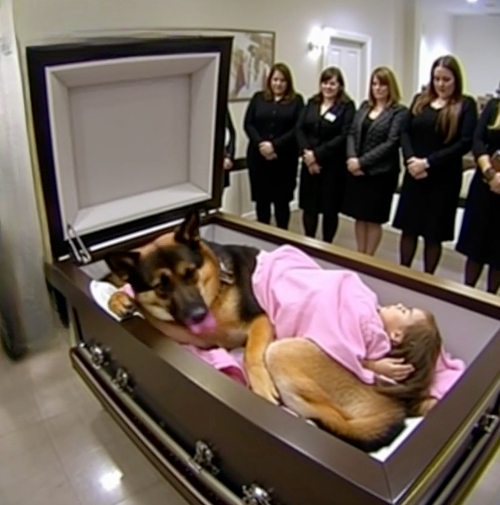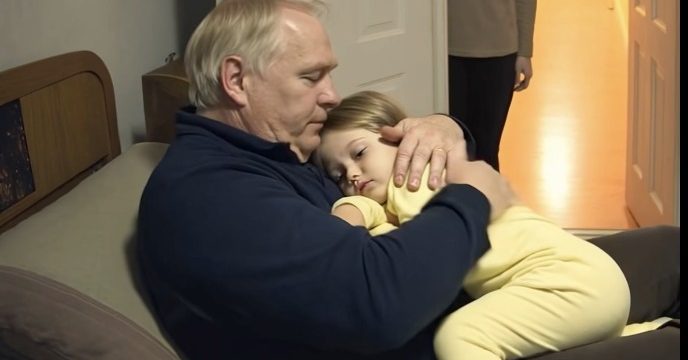The quiet air of the cemetery hung heavy with sorrow. Beneath a sky veiled in gray clouds, family and friends gathered to bid farewell to little Lily Parker, whose life had ended far too soon. Her parents, Anna and John Parker, stood close together, their hands intertwined yet trembling, as they faced the unthinkable. Every breath felt like a struggle, every moment like a weight pressing down on their chests. The pain of losing their daughter was unbearable, and yet something extraordinary was about to unfold—something that would blur the lines between heartbreak and miracle.

Beside the small white coffin stood Max, the family’s loyal German Shepherd. Since the day Lily was born, Max had been her shadow, protector, and best friend. They played in the yard together, shared snacks under the kitchen table, and fell asleep side by side. Max had always sensed Lily’s emotions before anyone else could—her giggles, her cries, her moments of quiet joy. And now, as mourners gathered to say their last goodbye, Max refused to move. He stood guard beside her, his eyes locked on the casket, his ears alert, his entire body tense with unspoken purpose.
As the undertakers approached to lower the casket, Max suddenly began to whine softly, then barked—a deep, guttural sound that echoed through the silence. At first, everyone thought it was grief, the animal’s way of expressing loss. But then Max’s behavior grew frantic. He scratched at the coffin, circled it, and pressed his nose against its surface. The mourners murmured in confusion. Some tried to pull him back, but Max growled—a sound unlike any they had ever heard from him. Anna fell to her knees, tears streaming down her face, whispering, “Max, please… it’s time to let her go.” Yet Max refused.
The air shifted, charged with something inexplicable. A few moments later, as Max continued to paw at the casket, one of the attendants noticed a faint sound—so soft it was almost imperceptible. He froze. “Did you hear that?” he whispered. Everyone fell silent. Then, there it was again—a faint thump, followed by another. Disbelief rippled through the crowd. The undertaker, pale and trembling, leaned closer. “Open it,” John said hoarsely. “Open it now.”
What happened next would be spoken of for years. When the lid was carefully lifted, a gasp tore through the crowd. Lily’s chest moved. Her lips quivered. Her small, fragile hand twitched ever so slightly. She was breathing. The cemetery erupted in chaos and joy. Paramedics were called immediately, rushing her to the nearest hospital while Max ran beside the stretcher, barking as if guiding them to safety.
At the hospital, doctors confirmed what no one could explain. Lily had been declared deceased hours earlier, her vital signs undetectable. Yet here she was—alive. Weak, but alive. Her parents were overwhelmed with gratitude and disbelief, holding her tiny hand as tears of joy replaced tears of grief. Doctors called it a “medical anomaly,” suggesting her heartbeat might have been too faint to detect during the initial examination. But to Anna and John, and to everyone who witnessed that day, there was no question—Max had saved her.
Over the following weeks, Lily’s recovery astonished everyone. Though fragile at first, she regained strength quickly, smiling whenever Max entered the room. It was as if she knew she owed her second chance at life to her loyal companion. The story spread across the community, soon reaching national headlines. People around the world were captivated by the tale of the dog who refused to give up on his best friend.
Scientists and animal behaviorists tried to explain Max’s actions. Some suggested he detected changes in Lily’s scent or faint sounds of life that human ears couldn’t perceive. Others believed it was instinct—the deep, emotional connection between a dog and their human that transcends understanding. Yet for Anna and John, no explanation mattered. To them, Max was more than a pet. He was family.
Months later, Lily’s laughter once again filled the Parker household. Max remained as protective as ever, rarely leaving her side. He would lie beside her crib, tail gently thumping, as if keeping rhythm with her heartbeat. Neighbors who once came to mourn now came to celebrate, bringing gifts and treats for the hero dog.
When asked about that day, Anna would always say the same thing: “Max knew something we didn’t. He refused to believe she was gone—and because of that, she’s still here.” The story became a symbol of hope, reminding everyone that love, in its purest form, can defy even the darkest moments.
Years later, when Lily was old enough to understand, she listened wide-eyed as her parents told her how Max saved her life. She would wrap her small arms around his neck, whispering, “Thank you for waiting for me.” Max, gray-muzzled and gentle, would lick her cheek as if to say, “I always would.”
The Parkers’ lives were forever changed—not just because of the miracle they witnessed, but because they learned that devotion knows no limits. Max had felt something beyond human comprehension, an unbreakable bond that bridged the space between life and loss. And in doing so, he reminded the world of the extraordinary capacity of animals to love, to sense, and to protect.
In the end, Lily grew up strong and full of life, often telling her friends the story of her “guardian angel with paws.” Max’s tale became legend in their town—a story of loyalty, instinct, and love that could not be silenced, even by death itself. The cemetery that once echoed with sorrow now stood as a quiet testament to a miracle. And every autumn, when the leaves began to fall, the Parkers would return to that spot—not to mourn, but to give thanks for the dog who refused to give up, and for the little girl who breathed again because he wouldn’t walk away.





